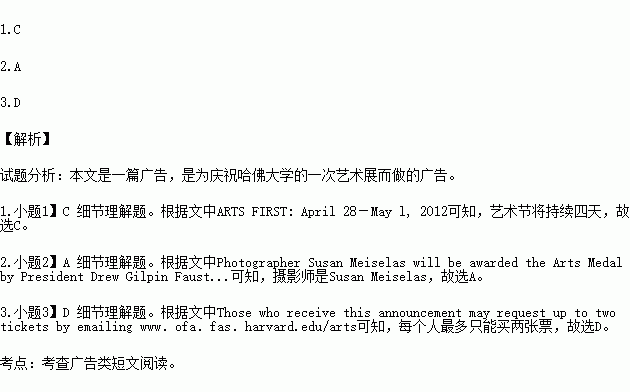题目内容
阅读下面短文, 从每题的四个选项(A、B、C和D)中, 选出最佳选项, 并在答题卡上将该项涂黑。
A
Celebrate the arts at Harvard
ARTS FIRST: April 28-May l, 2012
Experience non-stop art! Over 200 performances, exhibitions, films, and multimedia presentations Highlighting student and faculty creativity at Harvard.
Schedule of events: www.ofa.fas.harvard.edu/arts, or call 617 495 8676 to request a program guide.
Join us in honoring Susan Meiselas, winner of the 2012 Harvard Arts Medal
Photographer Susan Meiselas will be awarded the Arts Medal by President Drew Gilpin Faust and will take part in a conversation organized by John Lithgow.
Friday, April 29, 4 pm
New College Theatre, 10-12 Holyoke St., Cambridge
Admission free: tickets required. Those who receive this announcement may request up to two tickets by emailing www.ofa.fas.harvard.edu/arts or calling 617 495 8676. Please indicate one or two tickets, and reply by April 25.
1.How long will Harvard ARTS FIRST FESTIVAL last?
A.For two days. B.For three days.
C.For four days. D.For five days.
2.Who is a photographer?
A.Susan Meiselas. B.Drew Gilpin Faust
C.John Lithgow. D.Holyoke Johnson.
3.What do you know about the event at New College Theatre?
A.People must buy tickets for it.
B.Everyone can go to it.
C.It begins at 10 am on April 29.
D.One can get two tickets at most.

